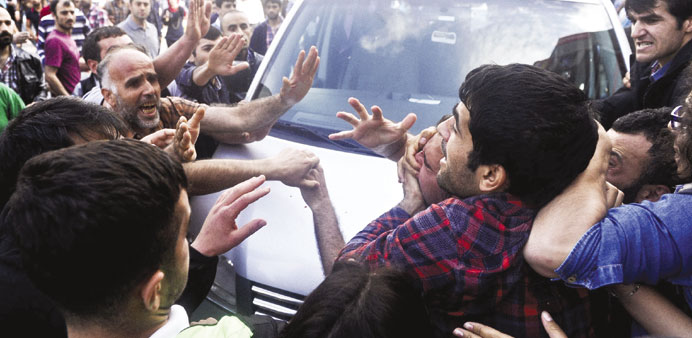Kurdish protesters try to stop fellow Kurds from attacking a man during a demonstration in the
Gaziosmanpasa district of Istanbul on Sunday, during which Turkish nationalists clashed with Kurdish protesters.
Turkey’s peace talks with Kurdish rebels are advancing despite recent unrest in the southeast, representatives of both sides said, and could boost Prime Minister Recep Tayyip Erdogan’s hopes of becoming president.
Erdogan is widely expected to run in Turkey’s first direct presidential election in August and support from its Kurdish minority, which accounts for around a fifth of the population, could be key to his chances of success.
He initiated peace talks with jailed militant leader Abdullah Ocalan in 2012 to end a three-decade insurgency which has killed 40,000 people.
Increased militant activity and street protests in recent months have sowed fears over prospects for a final deal.
However, Ocalan told a delegation of pro-Kurdish politicians visiting him on his prison island of Imrali, near Istanbul, on Sunday that “the process has reached a new stage”.
“At the point reached, there was a significant hope for a serious beginning and this hope must be protected and developed,” Ocalan said, according to a statement released by the Peoples’ Democratic Party (HDP) delegation.
Erdogan has invested significant political capital in peace efforts, boosting cultural and language rights at the risk of alienating some of his grassroots support. Ankara, the United States and the European Union term the PKK a terrorist group and Ocalan remains widely reviled among Turks.
A ceasefire called by Ocalan in March 2013 has largely held, but the PKK halted a rebel withdrawal to bases in northern Iraq last summer, complaining about the slow pace of negotiations.
Sirri Sureyya Onder, deputy HDP leader and a member of the delegation to Imrali, said that the government was showing the will to put the peace talks on a legal footing and had moved beyond bureaucratic talk to discussions between political delegations.
“If the government approaches this seriously, many things viewed as problem areas could disappear within a couple of weeks,” Onder was quoted as saying by Dogan news agency, adding that talks with Ocalan were set to become more frequent.
The optimistic tone follows a meeting held by Erdogan and top officials on May 19 to discuss the peace process, talks which Deputy Prime Minister Besir Atalay said were “critical”.
“The decision was taken to work on a new, more concrete road map and to take faster steps towards a conclusion,” Atalay said of the meeting in an interview on the Kanal 7 channel on Sunday.
Since then, protests have flared up in the mainly Kurdish southeast over the construction of new military outposts, with demonstrators blocking a highway between Diyarbakir city and Bingol province for the whole of last week in what Atalay described as a sabotage attempt.
Three soldiers trying to remove protesters blocking a road were wounded late on Saturday after coming under fire from militants located on surrounding hills, Milliyet daily reported.
Separately, Kurdish guerrillas shot dead a state-sponsored militia member in the southeast last week.
“Some are uneasy with the settlement process and are looking at how they can sabotage it,” Atalay said, adding that security forces would intervene as necessary.
“We as the government are showing our determination on the settlement process and will continue to do so until the end. There is no deviation in our will,” he added.
The pro-Kurdish Peace and Democracy Party (BDP) won a re-run local election ahead of Erdogan’s AK Party in eastern Agri province on Sunday, a development which could help lower tension in the region and foster positive sentiment towards the talks.
However, nationalist unease at the talks between the government and the PKK was laid bare on Sunday when an unidentified group attacked a pro-Kurdish party stand where signatures were being collected to call for Ocalan’s release.
Four people were wounded in the gun attack in the Istanbul district of Gaziosmanpasa, media reports said.
The PKK took up arms against Turkey in 1984 with the aim of carving out a separate state in the southeast for the country’s Kurds.
They subsequently moderated their demands, seeking increased political and cultural rights which were long denied.

